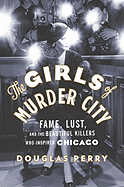
 "Every Chicago reporter knew that a gun-toting girl was a guaranteed public obsession, an instant celebrity, at least for a few days," Douglas Perry writes of the time when Prohibition-era rotgut, girls with itchy trigger fingers, married men who regularly did them wrong and a public hungry for sensational tales came together to the delight, and profit, of newspapers, high and low.
"Every Chicago reporter knew that a gun-toting girl was a guaranteed public obsession, an instant celebrity, at least for a few days," Douglas Perry writes of the time when Prohibition-era rotgut, girls with itchy trigger fingers, married men who regularly did them wrong and a public hungry for sensational tales came together to the delight, and profit, of newspapers, high and low.
During spring 1924 there was no shortage of juicy stories for the front pages of Chicagoland dailies: the stylish married woman Belva Gaertner shot her boyfriend (a car salesman, also married--but not to Belva) in the front seat of his car under cover of darkness; beautiful married Beulah Annan plugged her afternoon gentleman caller in the back and then continued to play the record "Hula Lou" on the phonograph as her unfortunate visitor bled to death on the hardwood floor. Reporters raced to outdo each other in nicknaming the latest gal with a gun: Wolf Woman, Tiger Girl, Spurned Portia.
Many of these women, while locked up awaiting trial for murder, played their parts with self-assured cool. They dressed carefully for photo ops, courted sympathetic reporters and offered irresistible quotes: "Sure, I whipped my millionaire husband, but it was he himself who gave me the whip and begged me, yes, even forced me, to do it." Perry presents readers with a picture of the delirious three-ring circus that took over the press and the courts when "Gangsterism, celebrity, sex, art, music--anything dodgy or gauche or modern boomed in the city."
Into this overheated arena wandered Maurine Watkins, a cub reporter covering the police beat for the Chicago Tribune. Watkins knew that if she wanted her stories to be on the front page she had to make them both hard-hitting and entertaining, preferably starring someone who had pulled a gun on someone else. Covering the beat with a sly twist (intimate and candid detail laced with a skeptically subversive edge), she saw that for women, Chicago was "the ideal locale to get away with murder." Defense attorneys were expert at manipulating juries by downplaying the adultery angle and highlighting how murder was an everyday occurrence. And if the accused happened to be attractive and socially prominent, well, one headline said it all: "PRETTY GIRLS GET FREE, UGLY ONES SENT TO PEN."
Watkins took all that she had learned as a police reporter and wrote the play Chicago: Beulah Annan morphed into Roxie Hart, and the vixens who lived to cheat and shoot their lovers dead entered American theatrical history, tough as nails and glamorized to the nines.--John McFarland
Shelf Talker: A jazzy reprise of a time when the criminal justice system in Chicago let good-looking killers off the hook and newspapers exploited every lurid detail of dalliances turned fatal for their front pages.

